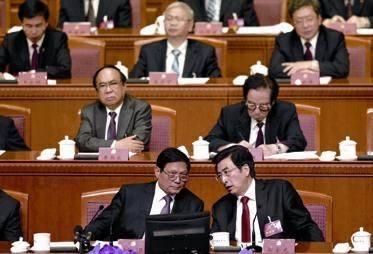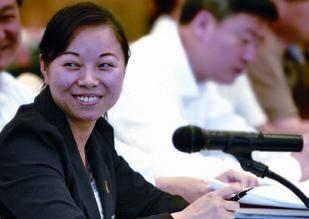Will of the Party
2012-04-29ByYinPumin
By Yin Pumin


With the conclusion of the 11th Beijing Municipal Congress of the Communist Party of China (CPC) on July 3, China has completed the reshuffling of its Party leaders at the provincialmunicipal level.
Out of 31 provinces, autonomous regions and municipalities, Beijing is the last to reshuffle its municipal Party committee, after the Liaoning Provincial Party Committee took the lead in October last year.
China began to reshuffle its Party committee secretaries and members of the Party committees at township, county, city and provincial levels last year.
Along with the changes of local Party committees, delegates are also elected to attend the coming 18th CPC National Congress later this year. Sixty-four delegates of Beijing were elected during the 11th Beijing Municipal Congress of the CPC.
Before Beijing, 28 out of the 40 electoral units for the national congress have finished the elections, including 24 provincial units and four units at the central government level.
A total of 2,270 delegates are elected from 82.4 million CPC members by 40 electoral units across the country. The number is 50 more than that to the 17th National Congress of the CPC five years ago.
The delegates are required to be Party members with outstanding political performance and have close ties with society, according to the CPC Central Committee.
A well-educated party
On June 30, the Organization Department of the CPC Central Committee released a statement, saying that the number of CPC members surpassed 82.6 million in 2011, up 2.9 percent from 2010.
In 2011, some 3.16 million out of 21.6 million applicants were accepted to join the CPC, according to the statement.
“The Party has been drawing more members from the forefront of business and production, and the performance of Party members is improving,” the statement said.
According to official figures, the number of female Party members is 19.25 million, accounting for 23.3 percent of the total. Members of ethnic minorities amount to 5.56 million, or 6.7 percent.
Meanwhile, among all members, 38.6 percent received education in a junior college or above, while 25 percent are below age 35.
Students and government employees are two major contributors to the rise in the number of Party members, said Lin Zhe, a professor with the Party School of the CPC Central Committee.
“Most colleges and universities encourage students to apply for Party membership while the reasons for more students joining the Party vary. Some do have a strong belief and take pride in the Party, but others join out of personal concerns, hoping that the Party membership can give them leverage in the job market,” Lin said.
There are a total of 2.77 million student Party members. A large number of welleducated young people are joining the Party.
People from different professions, especially workers and people with privatelyowned enterprises, are showing a stronger will to join the Party than before, Lin said.
“Party members are playing a leading role in all walks of life. Many of them have proven to be good examples for the public, and they have the ability to call on public support in major events, such as relief efforts during disasters,” said Lin, adding that more foreigninvested corporations are seeing the positive influence brought by employees who are Party members and many foreign companies in China have set up their own CPC organizations.
The number of CPC organizations at the grassroots level totaled 4.02 million by 2011, a 3.5-percent increase over 2010, according to the statement.
Party organizations have covered almost all publicly-owned enterprises and public service units, official data shows, and 983,000 non-public-owned enterprises and more than 200,000 social groups had established their own CPC organizations by 2011.
Some 44 percent of non-public-owned enterprises in Beijing, including foreigninvested and privately owned companies, had established their own CPC organizations by 2012, a drastic increase over 5.26 percent in 2006, according to a report by China News Weekly.
Prelude to the congress
The latest reshuffle of Party leaders, which produced 404 leadership members for the CPC standing committees in 31 provinces, municipalities and autonomous regions on the Chinese mainland, brought many younger and better-educated officials onboard.
According to a report by Peoples Daily, among the selected provincial-level Party committee members, 118 were born in the 1960s, accounting for 29.28 percent of the total number.
“The age distribution is in line with our countrys cadre promotion system, according to which provincial-level officials are supposed to be around 50,” said Gong Weibin, a professor at the Chinese Academy of Governance (CAG).
The CPC standing committees of Xinjiang Uygur and Tibet autonomous regions have the largest number of leaders born in the 1960s, with seven each. Normally, a provincial standing committee has 12 or 13 leaders.
Wang Yukai, another professor with the CAG, said the difficulties and challenges that younger officials face in ethnic regions can help improve their decision-making ability.
Zhang Xin, an associate professor of public management at Renmin University of China, said a younger leadership might be much more competitive in facing future challenges.
“Younger officials will be quick in learning and adapting to the fast changing environment. Thats an essential quality for advancing the countrys reform efforts. They are expected to spearhead some experimental programs in that regard,” Zhang said.
Liang Yanhui, a professor at the Party School of the CPC Central Committee, said the rising number of leaders born in the1960s could bring an increase in innovative ideas.
Meanwhile, 74.4 percent of the 404 provincial-level Party committee members hold masters degrees and 24 percent hold bachelors degrees.
Most noticeably, seven out of the 13 mem- bers of the CPC Standing Committee of Tianjin Municipality hold doctors degrees in management, economy, law or culture.
“Undoubtedly, the trend is that more senior degree holders from top universities will bring their expertise into management,” said Wang Guixiu, another professor at the Party School of the CPC Central Committee.
Gong said that due to the massive advances in the higher education sector since the reform and opening-up, the new generation of cadres had the chance to enjoy better education, noting that Chinas further development calls for administrators that have more professional experience in public governance and economic management.
Yang Yue, 44, the Party chief of Fuzhou, southeast Chinas Fujian Province, is the youngest person to become a member of the provincial-level Party committee, with a background in engineering.
Sun Zhengcai, 49, Party Secretary of northeast Chinas Jilin Province, once worked as a researcher at Beijing Academy of Agriculture and Forestry Sciences, and was editor in chief of the book Research on Corn Growing in 50 Years.
Sun has benefited from his strong background in a province that is a major producer of grains.
Zhu Congjiu, 47, who holds a masters degree of business administration specializing in banking, and once served as the chairmans assistant of the China Securities Regulatory Commission, was assigned in late May to east Chinas Zhejiang Province as a vice governor overseeing the finance sector.
Similarly, Tan Zuojun, former head of the China State Shipbuilding Corporation, was transferred to oversee Liaoning Province, the heavy industry and shipbuilding base in northeast China.
The smooth leadership transition of local Party committees is a key step in paving the way for a smooth leadership transition in the 18th CPC National Congress, said Gong, adding that putting state-owned enterprise executives in important positions has shown that the new central leadership will continue to focus on the countrys economic development.
“They can bring their useful experiences accumulated in managing an enterprise into social management and use their expertise to boost the local economy,” he said.
“The reshuffle is adapted to the future development of the CPC. It guarantees that the Party has the best talents to ensure governing capabilities and performances,” Gong added.
Representing peoples will
As representatives of the CPC members, the delegates to the 18th CPC National Congress should be the best Party members from all walks of society with advanced political performance, as required by the CPC Central Committee.
“The CPC National Congress is first of all a festival for Party members, as it provides the highest platform for them to enjoy democratic rights and to participate in public affairs,”said Cai Zhiqiang, a professor with the Party School of the CPC Central Committee.
In an effort to better represent its members, the CPC pledged to include more delegates from Party organizations at lower levels, such as migrant workers, at the upcoming congress.
The minimum proportion of grassroot delegates will be 32 percent, two percentagepoints higher than that at the previous congress in 2007, while the maximum proportion of leaders at various levels will be 68 percent, two percentage points lower than that in 2007, the Organization Department of the CPC Central Committee said.
Also, worker delegates must take up 10 percent of the total and should be made up of those from public and private enterprises in industrial and service sectors.
“The ‘two percentage points seem insignificant, but ... there will be more frontline delegates to better reflect the mass grassroots Party members opinions and voices,” said Wang with the CAG.
In south Chinas Guangdong Province, 34.8 percent of the 69 elected delegates come from the basic level, with nine worker delegates and five farmer delegates.
In north Chinas Hebei Province, 32.26 percent of the 62 elected delegates come from grassroots groups, with seven worker delegates.
In east Chinas Jiangsu Province, delegates from Party organizations at basic level took up 38.6 percent of the total and nine of them were worker delegates, including one migrant worker.
In addition, the CPC Central Committee required that the number of candidates should be at least 15 percent greater than the number of available posts. The rule has been followed in the elections.
According to the Organization Department of the CPC Central Committee, delegates of the 18th CPC National Congress will be elected through five steps—nomination and recommendation, investigation and inspection, publication of the list of potential candidates, confirmation of candidates, and selection of delegates.
“Every delegate must go through a comprehensive review and assessment of their performance to make sure they are outstanding candidates and can represent their groups interests,” said Chen Zhigang, a professor on Party research with the Chinese Academy of Social Sciences.
Cheng Junrong is a migrant worker and a delegate from Jiangsu. He is working at the Nanjing-based Chinese Peoples Liberation Army No. 5311 Factory. As one of the factorys top technical experts, Cheng has been honored several times as a national and provincial model worker since 1994.
“Moreover, Cheng is also a deputy to our countrys top legislature, the National Peoples Congress, so he is experienced in giving suggestions regarding social and political issues,” said Xu Ketang, the factorys CPC committee secretary.
Chengs election came after undergoing the five-step procedure.
The process began with 22,718 grassroots CPC units under the Nanjing Municipal CPC Committee nominating 7,375 people as candidates.
After selections by CPC committees at various levels, the Nanjing Municipal CPC Committee worked out a nomination list of seven people, including Cheng, for the provincial committee.
Then, the provincial CPC committee put 81 candidates, including two nominated by the central CPC committee, up for a final vote at the provincial party congress.
Finally, 70 delegates to the CPC National Congress were elected on May 14 this year, with the candidates outnumbering the elected delegates by 15.7 percent, higher than the minimum of 15 percent required by the CPC Central Committee. Cheng became the provinces first migrant worker delegate elected to the CPC National Congress.
“The election results show that the CPC Central Committee has attached more importance to giving a greater voice to grassroots Party members,” Cheng said. “Ill strive to do my job well as a delegate to the congress and make suggestions on behalf of migrant workers.”
In addition, more measures have been taken to publicize democracy to encourage broader voter participation.
The 3.89 million grassroots CPC units nationwide have been mobilized to take part in the elections. In Guangdong, about 4.6 million CPC members of 203,000 grassroots units are engaged in nominating candidates, accounting for 99.1 percent of the provinces total CPC members. The rate in Jiangsu was 99.58 percent.
In Jiangsus Kunshan City, 586 floating Party members have participated in the primary election of delegates.
In central Chinas Hunan Province, CPC organs have sent 4.13 million text messages about the election.
Petro China Daqing Oil Field extended the election to 156 overseas organizations via letters, Internet, text messages and phone calls, obtaining a 100-percent participation rate.
Alibaba Group, running the countrys leading e-commerce sites, has enabled about 2,700 young CPC members to take part in the election through online conferences.
Party Congress System
Communist Party of China (CPC) committees at central and local levels hold Party congresses every five years.
The highest level is the CPC National Congress, the main functions of which are to elect members to the Central Committee and the Central Commission for Discipline Inspection.
Terms of these committees last a maximum of five years. The national congress hears and examines reports from these bodies.
Members of the national congress traditionally meet in autumn, although this can be brought forward if the Central Committee deems it necessary or if more than one-third of provincial-level committees request to do so.
The CPC Central Committee meets in plenary sessions at least once a year, during which members of its Political Bureau will report and receive oversight.
When the national congress is not in session, the CPC Central Committee carries out its resolutions, directs the work of the Party and represents the CPC in its external relations.
When the CPC Central Committee is not meeting, the Political Bureau and its Standing Committee exercise the bodys powers.
As well as congresses, Party committees at provincial, prefecture and county levels meet in plenary sessions at least twice a year.
(Source: Xinhua News Agency)
